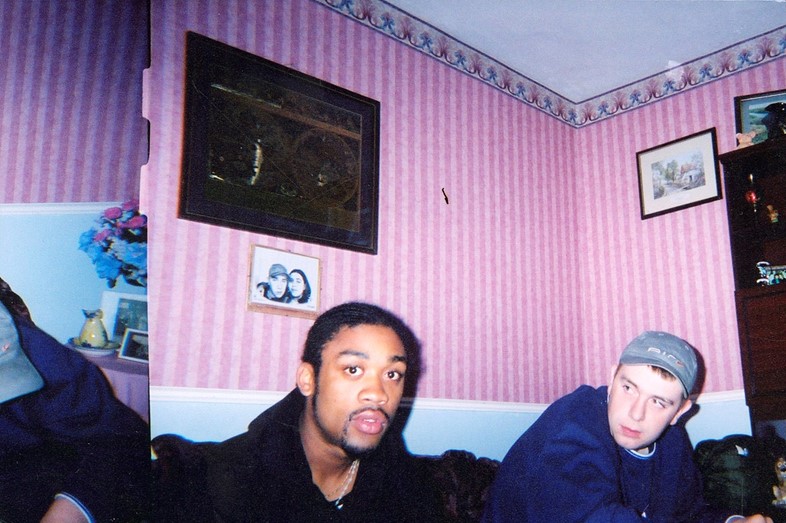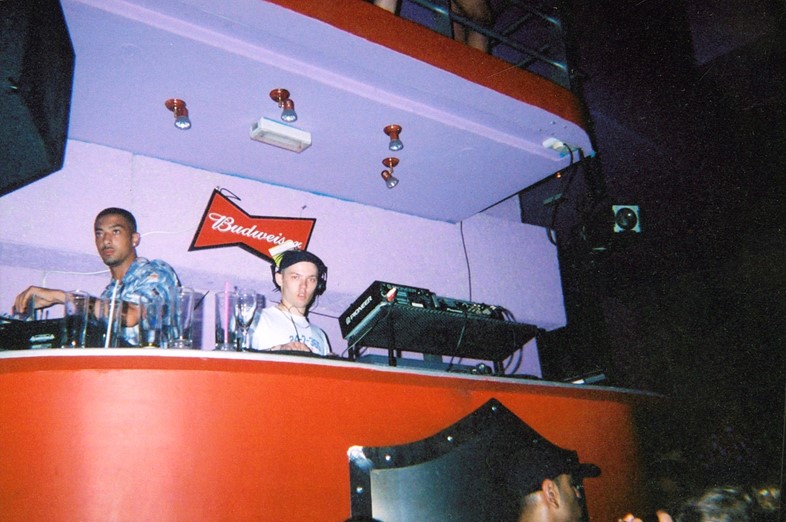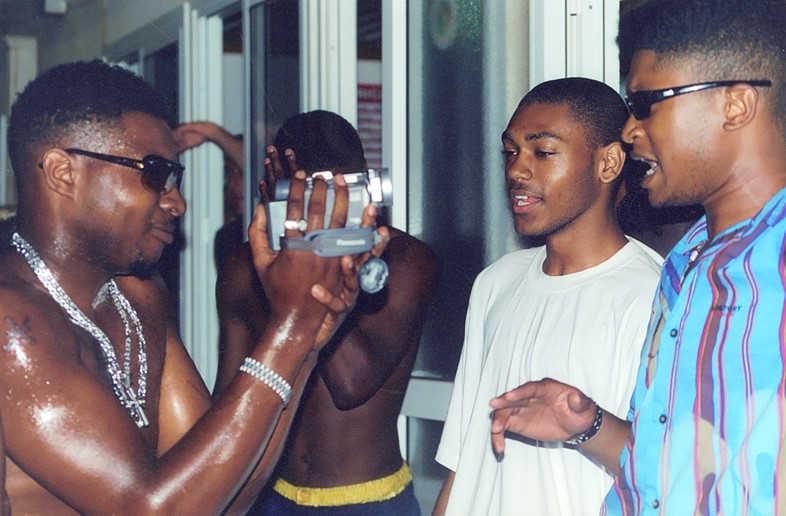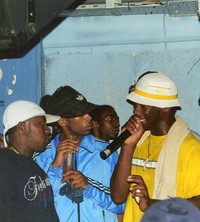The former Pay As U Go Cartel and Roll Deep member, DJ and producer narrates grime’s journey from a localised East London scene to a global movement
- TextStuart Brumfitt
“Big up Roald Dahl!” The legendary children’s author is the unexpected motor behind DJ Target’s new book charting the rise of grime. The former Pay As U Go Cartel and Roll Deep member, DJ, producer and record label head would think of the creator of The Twits, Matilda and The BFG to help push him through the occasional writer’s block. “When I was struggling, I’d think, ‘What would Roald Dahl do?’”
Out June 14, Grime Kids: The Inside Story of the Global Grime Takeover tells the story of the scene from the perspective of someone who lived it. “Someone the other day, said, ‘Do you see yourself as a grime historian?’ And I was like, ‘No, I don’t because I was actually next to Henry VIII. It’s different.’” (The Henry VIII here presumably being Wiley, and DJ Target one of the main members of the Royal Family).
Here DJ Target tells us some of the steps that took grime from a localised East London scene to a global movement that has fans from America to Australia and Nigeria to Japan.
The Birth in Bow
“When we were first getting into music in our early teens in the early 90s, it was very multicultural, very working-class. There was poverty and high unemployment, so it wasn’t the best set-up for young people to go on and do well, but we just got on with it. We were just all interested in music. We grew up on stuff that you hear in your household or on Top of the Pops, but as you get older, you pick your own music. We were into US R&B, hip hop, new jack swing, but at the same time, jungle was emerging out of London and taking over pirate radio. East London was such a hub of artists. On the one road where I grew up, there was me, Dizzee Rascal, Tinchy Stryder, members of Roll Deep, Wiley was two minutes round the corner. Then if you branched out a little bit further within East London, you had Lethal Bizzle, Kano. The list goes on.”

Pirate Radio
“Jungle was the first music we could directly relate to and a lot of the DJs and MCs on stations like Kool FM or Weekend Rush were down the road, so we’d see them driving their cars past. It felt relatable, rather seeing an American rapper with a massive chain on MTV. We were on the radio when we were 14, 15 years old and we were still too young to penetrate that scene, but we were starting to create a buzz on pirate radio. Without pirate radio, all of this that you’re seeing and hearing now couldn’t have progressed. It was the first platform that let us on. People were recording sets on cassette tapes, then posting them to their cousins in Birmingham, posting them to people in Manchester. We were creating a buzz like that. Rinse FM is where a lot of the early grime artists got on. Déjà Vu FM. They were the big East London pirate radio stations. We used to go on pirate radio tours and were building up all these different audiences.”
“Without pirate radio, all of this that you’re seeing and hearing now couldn’t have progressed. It was the first platform that let us on”
The Raves
“It wasn’t until three or four years later that UK garage was starting to bubble up and we went to a couple of nights. The first big one I went to that was a game-changer for me was going to the Coliseum in Vauxhall to a night called Exposure. That was the first night we all had a proper night out. We were like, ‘This is it!’ DJ EZ was on and seeing him was next level. When it came to skills and how he mixed and dropped records, he had the crowd in the palm of his hands. I remember watching and thinking, ‘I wanna do this.’ Later, Sidewinder in Milton Keynes was the first big club event to showcase new grime music. You also had Wiley’s Eskimo Dance. There were smaller clubs and some grime events at Cargo, which was quite seminal. Around that time, in the years when grime was taking that dip, there was the 696 form, so a lot of events were getting cancelled and it was hard for artists to perform. There wasn’t a grime club infrastructure for years.”

Ayia Napa and Beyond
“A lot of the first wave of grime artists would have experienced Ayia Napa during that whole garage wave or the first early grime years of 2003-2004. We’d all just head to Ayia Napa for the summer. That was the main place for UK garage especially, but eventually you’d get all the grime artists performing there. I first went to Ayia Napa during the whole UK garage thing, but the following year we went back and we’d set up Pay As U Go Cartel and had a buzz as UK garage artists, so the next year we were playing. We’d been to places around Europe – here and there we’d been doing shows in Prague, Brussels, Paris or Berlin, but they were very small early on. You could feel that it was starting to grow, then the press started to write about it, then YouTube, then social media and that’s when you could really get to the people and cut out the middle men, through MySpace, YouTube and Channel U.”
“We wanted to make music for these MCs to say lyrics about our local area and our lives. That’s where grime was born”
Garage to Grime
“Everyone was getting into garage. It was about ’99 and we started doing garage sets on the radio when we were about 18, 19. Pay As U Go Cartel, along with Heartless and So Solid, were about three of the most influential collectives that made that connection from garage to grime. A lot of young MCs were getting into garage, but the music was starting to sound a little bit different coming from the younger end of the audience and was getting more instrumental to cater to the MCs to do their thing. That’s when a bit of a separation happened between the garage crew who were still going for their female vocal tracks, all very fluffy and two step. We wanted to make music for these MCs to say lyrics about our local area and our lives. That’s where grime was born. We noticed really quickly when we set up Pay As U Go Cartel that we were getting love from across the country, but it was on an underground club level. It wasn’t until we really started to make that transition into grime that we really started to notice this fanbase building for this new music. Dizzee Rascal obviously came through. Him and Wiley were killing it.”

The Second Wave
“People realised that chasing commercial success wasn’t why we got into it in the first place. The record German Whip by Meridian Dan dropped and that was a straight grime record that was everywhere. It reenergised everybody and made everyone realise you can actually penetrate the mainstream with straight-up, street grime records with no singing on the hook, nothing glossy, nothing made for mainstream national stations. It was just an honest grime record and it flew and that gave people hope. And in 2014, Skepta was over in the States doing his thing and creating a buzz for grime and doing it in a way that UK artists had never done before. Usually you’d get signed here, you’d blow up here and if you were big enough here, you’d get to go to America and have a shot at their mainstream. But Skepta was like, ‘Nah, I’m gonna go out there and I’m get amongst their underground scene and build it from the ground up.’ Before that, to go to America, you had to Americanise because they didn’t understand it. Now it’s not just America – it’s Japan, Africa, Australia, Europe.”
“[German Whip by Meridian Dan] reenergised everybody and made everyone realise you can actually penetrate the mainstream with straight-up, street grime records”
Grime Now
“All these artists that are blowing now, everything’s true to them – the accent, what it’s about, what it reflects, where they’re trying to get to. It’s great – there’s so much choice and everyone sounds different and has a different story. Now you’re seeing it in Croydon with Stormzy and Krept & Konan. Creativity breeds more creativity, success breeds success. There was a time when UK artists tried to sound American. Now it’s like, ‘Just do yourself.’ The whole UK artists rapping American thing, I couldn’t get my head around. I was like, ‘Why are you doing that? It sounds terrible! And I could just listen to actual Jay-Z instead, not the South London version!’”
Grime Kids: The Inside Story of the Global Grime Takeover is out June 14















